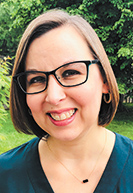Subscriber Benefit
As a subscriber you can listen to articles at work, in the car, or while you work out. Subscribe NowDuring a two-day trial, family law attorney DawnMarie White had her first miscarriage.
Not realizing she could speak to the judge privately, the young attorney informed the judge in front of opposing counsel that she might need a break during the trial if her doctor’s office called or if her body shut down.
“For the most part, all of the attorneys were very kind and not necessarily accommodating, but they did what they could,” White said. “But there was one colleague that throughout the years, even still, has not been a very good colleague and has tried to bring it up at inopportune times to throw me off my game before hearings.”
The following year, White and her husband had their first child, who she describes as “healthy and happy and perfect.” But another pregnancy loss early last year left White struggling to know who she should confide in.
“It made me feel like all my colleagues knowing this information about me may not be the best choice,” she said. “But I knew I needed support and we were locked down, so there wasn’t much support anywhere.”
White ultimately published an article online about her experience, but that also left her wondering if another attorney might try to use the information in the same way. Although she was referred to a local support group, White said the possibility of running into a potential or opposing client could be uncomfortable later on.
“I was thinking it would be really nice to have other attorneys that would understand what I was going through that I could talk to, but also, it wouldn’t be a problem in court,” she said.
After proposing her idea for an attorney-based pregnancy loss support group with the Indianapolis Bar Association, White was given an emphatic “yes” to put it together.
A safe space
Offered through the IndyBar, the new support group provides a safe and supportive environment for up to six attorneys who are experiencing infertility and pregnancy loss. Participants can engage in both peer and facilitator-led sessions during the group, which White said will remain small to allow time for participants to share and be heard.
Indianapolis attorney John A. Kassis, Wanzer Edwards PC and White’s firm, Emswiller Williams Noland & Clarke LLC, serve as financial sponsors for the group. The group’s facilitator is a licensed clinical social worker who helps participants engage by offering topics to get them talking and thoughtfully leads the group through discussions.
Group meetings began in March and occur twice a month for four months. White said participating attorneys have been supportive of one another, empathic and caring.
“It’s kind of nice because even though (the group has only met) a few times, it’s one of those situations where you start talking to someone about this experience that you share and there is almost an immediate bond,” she said.
White wanted the pregnancy loss support group to be a place where attorneys could remove the mask of strength worn before clients in the professional setting.
“I wanted a place where attorneys could come and be, whether they are unhappy or mad or frustrated or annoyed or happy. Whatever it is,” she said. “They get to be however they are.”


Speaking in the silence
Making sure individuals who have experienced pregnancy loss have the ability to express themselves in the best way for their personal healing is critical, said Jennifer Bute, Ph.D., and Maria Brann, Ph.D., professors in the Department of Communication Studies in the School of Liberal Arts at Indiana University-Purdue University at Indianapolis.
In their research on communication about miscarriage, Bute and Brann have found a culture of silence surrounding pregnancy loss. What’s interesting, they said, is that while no one seems to talk about it, infertility and miscarriages are incredibly common.
“People are fearful in a lot of ways to talk about it because you combine things like death and reproduction and all of these issues that are silenced on their own anyway, and when you put them together, people just don’t know how to talk about it,” Brann said.
A recent series of three studies published in The Lancet medical journal found that 1 in 10 women miscarry during their lifetime. But while the traumatic experience is common, the studies concluded that the impact and consequences of miscarriage are underestimated, resulting in a “fragmented” and “inconsistent and poorly organized” system of care and attitudes toward pregnancy loss.
The Lancet researchers are calling for “a complete rethink of the narrative around miscarriage and a comprehensive overhaul of medical care and advice offered to women who have miscarriages.”
Finding the right words to say — or saying nothing at all — is one of the first hurdles to overcome, Bute said. Validation of someone’s experience is key in being supportive, but well-intended responses can often be more harmful than helpful.
“(For example), ‘Maybe it wasn’t meant to be,’ or ‘You can try again.’ Those are messages that women in our research have described as not being helpful messages,” Bute said. “You could instead say, ‘What would you like to talk about?’ or ‘How can I support you?’ Or, just giving them the space to talk while we listen.”
White agreed, noting that people often reach for cliches or platitudes that aren’t particularly comforting.
“It is not helpful for me when you say, ‘Your baby is a better place now.’ I think my arms are the best place for my baby,” White said. “A lot people unfortunately are coming from a good place, but they don’t always react in a way that is helpful.”
Showing support
While parental leave in recent years began appearing in law firms’ policies for both new parents, rather than the traditional maternity leave, some law firms already have policies on the books specifically for pregnancy loss.
Taft Stettinius & Hollister has a pregnancy loss policy that allows at least two weeks of paid time off for employees who suffer a miscarriage. The process is discreet and completely confidential, said managing partner Bob Hicks. The policy is geared toward all families and partnerships.
“While we disclose the policy and it’s open, we don’t disclose the outcomes beyond one person who we trust to administer this,” he said.
For White, her smaller law firm gave her the time and space she needed to heal emotionally and physically, offering to have colleagues take over her caseload during her most recent miscarriage during the pandemic.
“It actually happened during a morning where I was supposed to be in a trial. So another attorney got on Zoom and said, ‘she can’t be here, there is a medical issue, we need a continuance,’” she said. “I am really lucky to be with my firm.”
Seeking healing
While some attorneys responded immediately to joining the new pregnancy loss support group, White said that others were more hesitant and some reached out but disappeared. That’s okay and understandable, she said.
“Especially as an attorney, it’s really hard to open up in this way about something that is so personal, especially with someone you don’t know,” she said.
If funding is available to hire another facilitator, a second round of the group will be hosted in the future with availability for anyone who requests to join.
“I think it’s imperative that everyone has a place for people to share their thoughts,” White said. “It’s the kind of club that you don’t want to be part of, but you are, and you’re grateful to have the club around.”•
Please enable JavaScript to view this content.
